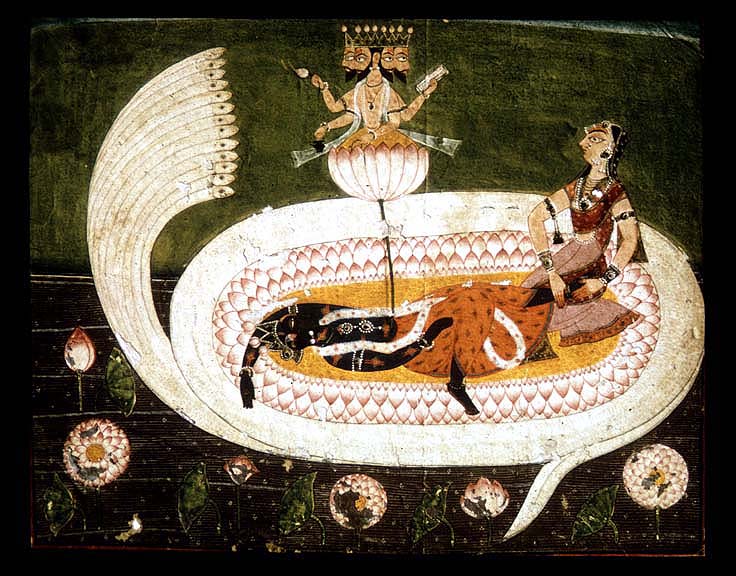
The Earth, a lotus, was navigating the waters. The "flower", pushkara, is also "rock": so say the gods, "who love secrets" and therefore play with meanings. And it is also the "nest of the waters". Life: an intermittent fever amidst long periods of rest, during which the leaf wandered the liquid surface. That leaf was a bed. Whom did it host? The sleeping god who had perhaps just finished creation, or vanquished his enemy, or descended into the worlds as some avatar. The leaves of grass could become the coils of a snake, intertwined like the weave of a basket. Vishnu reclined gently on this bed. The beginning: something that is not given in nature. The first distinguishable image is that of Vishnu navigating the waters, his head rested on Sesha. Sesha is the "residue": the new is an oldest lump unwilling to dissolve. Not only the world is resting upon the residue, but is the first of all residues. Even in this image that precedes every other, Vishnu was resting on the past. The first world is always at least second, always hiding a precedent. Vishnu's belly was uncovered, dark. From his navel a lotus stem arose, connecting his body up to the flower. Everything else around was a consequence: something incongruent, so disconnected, like all the consequences, like all the worlds, forgetful of their origin. A sudden excess of sattva, of "being" -like a blow, a wave, a sigh - woke up the young god navigating adrift in the silence. Enough for Vishnu to realize that the world was empty. Surprised Vishnu noticed that in the void a stem had grown. From where? He lowered his eyes and saw the stem grew from his navel. His eye followed it up, to the point where the blossoming lotus flower was open to the sky. Sitting there atop the petals was Brahma with his four heads. Thoughtful. He was also looking around acknowledging the fact that the world was empty but for the presence of that body, reclined over the waters, from which his soft suspended residence was rising. Vishnu and Brahma ignored each other. Each convinced to be wholeness. (from Roberto Calasso's "Ka". The book "Ka" is published in Italian by Adelphi)
